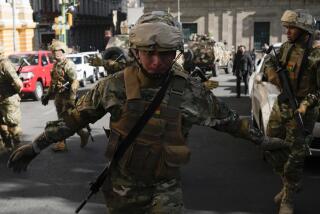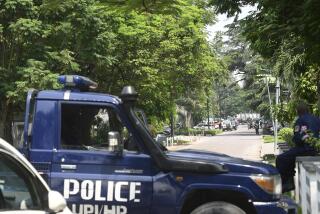Egyptian President Morsi appears besieged; six dead in clashes
CAIRO -- With tanks guarding his palace and officials defecting from his government, Egyptian President Mohamed Morsi appeared besieged Thursday in a nation divided by deadly protests and an escalating political crisis he started two weeks ago when he seized near-absolute power.
For the first time since they retreated to the barracks in August, soldiers from the Republican Guard strung barbed wire and parked tanks outside Morsiâs office. The presidentâs credibility has been further damaged by the resignations of six senior advisors and three other officials.
Six people died and more than 600 were injured in clashes that began Wednesday between Islamist supporters of Morsi and protesters from mainly secular opposition movements. Protesters are demanding Morsi curtail his authority and cancel a Dec. 15 national referendum on a much-criticized proposed constitution drafted by an Islamist-dominated assembly.
PHOTOS: Thousands protest outside Egyptâs presidential palace
Echoing the national outrage over the recent bloodshed, Zaghloul Balshi, the official in charge of overseeing the referendum, resigned in protest: âI will not participate in a referendum that spilled Egyptian blood,â he told a television station.
The head of Egyptâs state television and radio also quit as did Rafik Habib, a Christian who resigned as an aide to Morsi and as vice president of the Muslim Brotherhoodâs Freedom and Justice political party, which Morsi led until his election in June.
The president was expected to address the nation Thursday night in an effort to contain the crisis.
Morsi and his Muslim Brotherhood have refused to retreat on the referendum and the opposition has promised fresh protests. Morsi has the political edge; the Brotherhood is expected to turn out enough voters to pass the charter. But two weeks of unrest have shaken the stock market and sharpened the passions of the opposing political camps.
âWe are facing two scenarios: civil war or another military takeover,â said Mohamed Fawzi, an anti-government protester. âMorsi and the Brotherhood have given us a worse dictatorship than Mubarak. They have a bad manâs dream for the country. The opposition is doing its best but we donât know what will come. Our opposition leaders are bad, full of self-interest.â
Doubts about the Brotherhoodâs tactics were underscored Thursday when Al Azhar, a revered institution in Sunni Islam, publicly urged Morsi to rein in his powers and enter unconditional dialogue with opposition forces. The statement added new frustrations for Morsi because Islamists writing the proposed constitution included an article that requires lawmakers to consult Al Azhar on matters pertaining to sharia law.
The Brotherhood has often attempted to portray protesters as unruly leftists and secularists, brandings that suggest those against Morsi are not true Muslims. That has riled many protesters in Tahrir Square and a number of them interviewed Thursday emphasized they were good Muslims.
âThe Brotherhood is dividing us and they talk of religion as if only they own it,â said Mahmoud Mohamed Jahin, a farmer who was protesting in Tahrir Square. âMorsi wants to be the king of Egypt and he wants the Brotherhood to be his princes. . . But there is no one guaranteeing the people peace and prosperity. We are aware of this now and will not back down.â
ALSO:
Probe ordered into killing of Afghan student
U.S., Israel worry Syria rebels could get chemical weapons
Noted PR consultant arrested in Britainâs sex abuse scandal
More to Read
Sign up for Essential California
The most important California stories and recommendations in your inbox every morning.
You may occasionally receive promotional content from the Los Angeles Times.











